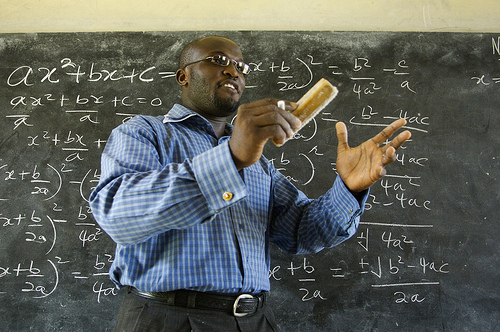Imploring teachers to undertake a licensure examination as a means of ensuring quality education is a brilliant idea that needs to be commended.
However , it would be delusive of the government to presume that the passing of a licensure examination at this moment would guarantee quality education delivery in Ghana. At least, not now!
There are other pressing factors which in my modest opinion should be tackled first. The challenges confronting quality education delivery are multifaceted and require a holistic approach.
Firstly, let us critically analyse the kind of students who enter the training colleges to be trained as teachers.
It is a fact that students considered as the most “intelligent†proceed to the universities upon completion of senior high school whereas students considered as “average or weak†enter the training colleges to be trained as teachers.
From the foregoing, how do we as a country expect to have
Until this egregious notion is dispelled and properly framed to represent the reality that both intelligent and average or weak students can be trained to become teachers, the current challenges facing us will persist irrespective of the number of examinations teachers will be made to take.
To correct this, a quota of the students who excel after senior high school should be given the scholarship to be trained as teachers.
I will proceed to look at the very fundamental stage in education. Majority of infrastructure accommodating pupils at the kindergarten level in public schools are in deplorable condition. The very beginning of the education of a child in the public school is evidently in a dreadful state. How then do we expect such a child to perform well later in life? Until the government takes a decision to improve the condition of pupils at the kindergarten level in the public schools to match up with their counterparts in the private schools, the writing of exams will be †much ado about nothingâ€.
Another point worth noting is the unavailability of teaching-learning materials in most public schools. Students at the basic level learn largely through interactions with physical objects. These materials which are supposed to be available to aid teachers in teaching and learning activities are absent in most public schools.
Ironically, these materials are in abundance in the private schools and as a result, pupils who are privileged to have these materials at their disposal tend to perform better than their counterparts who are not privileged enough to have them. Asking teachers to write a licensure exam is not going to mitigate this challenge.
Majority of teachers in the public sector are not satisfied with their conditions of service. Among the many professionals in the country, teachers are the least remunerated despite their enormous contribution in producing those professionals.
How can we be so mean to teachers? The teacher has to pay for his rent, utilities, transportation and clothing from his or her meagre salary. Whereas other professionals enjoy some of these benefits for free.
How then do we expect the teacher to feel motivated to give out his or her best?
Sometimes you look at the destitute nature under which teachers work and you wonder whether it is a curse to be a teacher in Ghana?
Although the licensure examination is an incredible idea, it is not going to improve the quality of education. The conditions of service for teachers should be reviewed and teachers should be properly remunerated.
Lack of effective supervision and in-service training for teachers have also contributed to the poor quality of education in the country.
Personally, I think the officers in charge of supervision have not lived up to
Lack of in-service training affects teachers since they are unable to keep up-to-date with new methods of teaching and new trends in education. Without
In the light of these, I think that even though the licensure exams is a great initiative, it is immaterial at this moment and will be inconsequential to quality education delivery.
I want to urge the government to rather focus on addressing the fundamental issues militating against quality education in Ghana.





